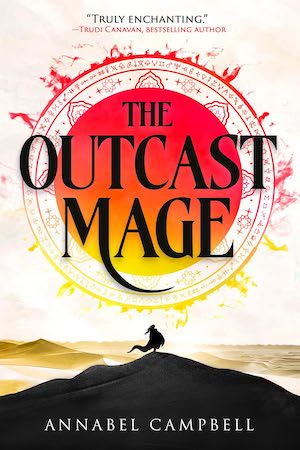Magic built the city of Amoria. Magic is at the fingertips of the most powerful people in the city, ingrained in the walls and the columns and the glass dome that envelops the city. It is the only place on the continent that mages are treated as equals rather than objects of the government.
But magic is also tearing the city apart. Several prominent mages, including the politician Oriven, have decided that equality is not enough; that the city should belong to mages, and non-mages (derisively known as hollows) should live only in its outer quadrants. The only one standing in his way is the Wizard Haelius Akana, the most powerful mage alive, born to a non-magical family and unwilling to sell them out for his own gain.
Unfortunately, Haelius is also a bit of a mess—a “disaster wizard”, in author Annabel Campell’s words. He “borrows” important artifacts from the city archives before Oriven can get them, swipes investigatory evidence when he thinks no one’s looking, and infuriates his friends with his blithe disregard for his own health and safety. When a struggling mage from a non-magical foster family is attacked by her fellow students, Haelius goes one step further and stakes his power as the head of the Academy on being able to teach her to control her magic,
It’s a challenge Oriven is only too happy to accept. Teach a girl who’s never shown a flicker of magical control, who’s known throughout the Academy as the “hollow mage”? Good luck.
For months, it seems like he’s right. Nalia is studious, and determined, but the magic bubbling inside her doesn’t budge. She knows all the theory inside and out, the way magic interacts with the four key elements. She speaks and draws the phonemes perfectly, but no matter how Haelius tries to teach her, nothing changes. Then she touches one of Haelius’ “borrowed” artifacts, an obsidian shard dating to the founding of the city—and her magic, at long last, awakens.
Suddenly, Oriven and the others who dismissed her are much more interested. Nalia’s magic is a type that hasn’t been seen in centuries, one that taps into the primal elements more directly than ordinary magic. Haelius must spirit her out of the city before they lock it down entirely to get at her.
Buy the Book


The Outcast Mage
The Outcast Mage is an ambitious, sprawling fantasy, mixing the intricacies of politics, magic, and dragons (oh, yeah, there are dragons. Did I mention the dragons?), with just one glaring problem: It has the wrong protagonist. It’s Nalia taking us through this glittering, grand world, while Haelius is reduced to a scant few chapters—and that was the hurdle that kept me from liking this book as much as I wanted to.
Don’t get me wrong, I love fierce female protagonists figuring out their magic (like Kosara, from the Compendium of Monsters series). I jumped at the chance to review this book because I thought Nalia sounded like such an interesting lead: a magic-less girl in a city of mages, dealing with the schemes of the elite and powerful. But she and the other viewpoint characters—a mage senator, Larinne, and a foreign priest, Entonin—just don’t do that much. The plot happens around them, and they’re variously happy or sad about it, but they don’t drive it.
Part of the trouble might be that Nalia is a McGuffin of a protagonist: She, as a person, is less important to the plot than the power inside her and what it represents. Another part might be that, unlike other McGuffin protagonists in fiction (or characters who carry MacGuffins), she’s not given a choice whether she wants to bear the burden of power. The laws of Amoria dictate that anyone with magic must learn to use it; failing or giving up means exile or worse. Between that and Haelius gambling the fate of the city on her success, Nalia can’t reasonably make any other choice than to try and figure out her power.
And that’s a shame! Nalia is perfectly heroic: She cares about her family and doing the right thing; she wants equality for the mages and non-mages of Amoria. But she never gets a chance to back out; she never gets that pivotal moment of “accepting the call” that’s such an important part of the archetypal hero’s journey. The closest she comes is her attempt to slip out of Amoria after her magic has awakened; she realizes the danger she’s in, but even then it’s external forces—a chance encounter with the same vengeful students who attacked her earlier in the book—that drag her back into the plot rather than internal motivations.
Instead, it’s Haelius who has the hard choices to make. There’s a wonderfully tense scene between him and his father, who is the leader of the non-mage senate. With tensions at a breaking point and sporadic riots already in the streets, Senator Akana asks his son to fight for the non-mages and use his power to beat back Oriven. Haelius refuses. If he takes sides, he tells his father, then it’s full-on civil war, and he’ll do anything to prevent that.
Another part of what shapes the story, which I’m obligated to mention in the review, is that The Outcast Mage is the first book in a series and knows it. Most of the threads of politics, magic, and dragons it lays down aren’t anywhere close to resolved by the end of the book. Instead, like Nalia, we’re cast out into the wilderness and realizing how much we don’t know. Further books promise an adventure to the Great Library, where we’ll hopefully drill down into the history of the land, the way magic and its counterpart, anima, differ from one another, and what exactly dragons have to do with the first two—but at the end of The Outcast Mage, we’re still waiting for those answers.
Perhaps when the series is complete, The Outcast Mage will hold up better than it does now. The third and final section of the book significantly expands the scope and stakes of the work, and I hope the next books of the Shattered Lands series will build on this. I’ll certainly be watching out for them, if only for more Haelius.
The Outcast Mage is published by Orbit.

